Red Obsession
POSTED ON 22/04/2013The exorbitant price rises for the great 2009 Bordeaux vintage focused global attention on Bordeaux as an investment vehicle as never before. In search of such a vehicle to place their newfound riches, the Chinese new wealthy fell for Bordeaux in general and Château Lafite in particular as the ultimate must-have luxury goods collectible.
Directed and written by David Roach and Warwick Ross, with intelligent input from associate producer, Andrew Caillard MW, Red Obsession is a 75-minute documentary film about the Chinese infatuation with Bordeaux and how the star-crossed couple fell in and out of love.
Narrated mellifluously by Russell Crowe, with mouthwatering time-lapse and aerial shots of the majestic châteaux as you’ve never seen them before, Red Obsession kicks off like a super-budget Bordeaux Tourist Board commission.
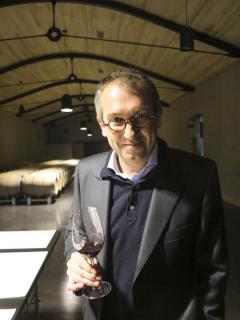 Thomas Duroux of Château Palmer
Thomas Duroux of Château Palmer
The region’s history, identity and pedigree are complemented by a series of encomia that are almost embarrassing in their fulsomeness. ‘Its prosperity has always been tied to the sifting nature of global economies’, intones Crowe to the soundtrack of I Put A Spell On You.
Talking heads take up the theme. The most convincing proponents are a velvet-voiced Oz Clarke, speaking of ‘the buffetings of history, politics and taste’ and the charismatic Christian Moueix of Château Hosanna and now ‘consultant’ to Château Pétrus, ‘..it’s the love you bring…’
Not far behind comes Château Palmer’s Thomas Duroux ‘when you taste the fruit…it’s a piece of history, a soul, a style, a DNA’. And check out this Cantona’ism from Châteaux Margaux’ Paul Pontallier ‘What makes it so magical is difficult to explain …because it’s so magical’. You couldn’t really say that about Jacob’s Creek, now could you.
Just when you think you might be in danger of nodding off after endless eulogies from, among others, Francis Ford Coppola, Michael Parkinson, Jancis Robinson MW and French critic Michel Bettane, the real story begins. Andrew Caillard sets the scene by telling us that ‘in 100 years you might get five or six legendary vintages’. Hey presto, 2009 is one such vintage.
Yes, ‘behind the excitement’, says Russell Crowe, ‘is the commercial reality that en primeur is all about business….as the price of wines has escalated the inevitable has happened, they’ve become too valuable to drink’. Bordeaux Index’ Gary Boom confirms that ‘en primeur essentially is an investment purchase. Wine has outperformed the major investment markets since 1982’.
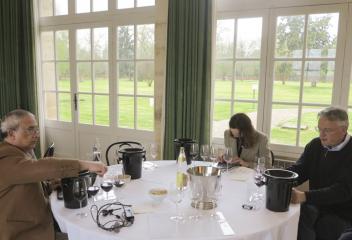 In the left corner, Michel Bettane, in the right, Andrew Caillard MW
In the left corner, Michel Bettane, in the right, Andrew Caillard MW
Explaining how en primeur, the complex futures market, works, Crowe informs us that ‘prices are not released until the critics release their scores’. In fact the only critic Bordeaux really listens to is America’s Robert Parker but since Jonathan Nossiter poked fun at him in in Mondovino, the man from Monkton, Maryland is thought to have turned up his precious nose at any involvement with Red Obsession.
A shame if true because the character who really should take centre stage at this point appears, like Banquo’s ghost, only peripherally. Shots of the man himself at a press conference at Hong Kong Futures 2011 and the narrator again 'internationally renowned critic Parker warns châteaux should drop their prices or suffer the consequence of an overheated market’. The scene then shifts to China.
The portrayal of the rich Chinese and their naïve obsession with top Bordeaux is by some distance the most fascinating and original part of the film. Time-lapse shots of the Bund in Shanghai are interspersed with the portrayal of China’s transition from Cultural Revolution to the fastest-growing market economy in the world.
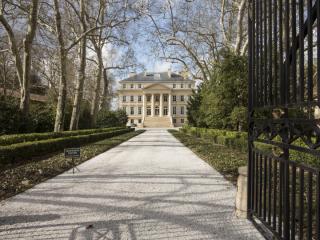 Château Margaux - open for business
Château Margaux - open for business
According to Singapore-based wine writer Ch'ng Poh Tiong, ‘the Chinese have no fear because they say how worse off can we be, we can just start again. This is why people are so dynamic. People shoot for the stars’.
We see Château Margaux’ Thibault Pontallier flaunting his wine at a beauty contest with the 32 most beautiful women in China. China is getting excited because ‘it’s new, it’s fun and it’s French… we have so much potential in this market’.
Peter Tseng, we are told, with a cellar valued at $60 million, has made his fortune as a manufacturer ‘in the pleasure industry’. Cue shots of sex toys on a production line. He admits to getting carried away and just having to own a top château when he’s made up their mind to buy it.
‘Wine is now the New Silk Road, one of the intermediaries to connect China with the rest of the world’, says Rim Tse. Fongyee Walker, an educator based in Beijing, is eloquent on the psychological allure of Bordeaux for its rich businessmen.
‘There’s always been an interest in wine. A type of exoticism is coming from the West. It’s viewed as being civilized. They buy the wine as a symbol of their status and what they have achieved in China. It gives them position and face and it’s a way of presenting themselves as being knowledgeable about western culture’.
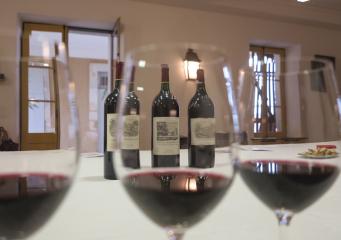 Tasting, Tasting, Tasting at Château Lafite
Tasting, Tasting, Tasting at Château Lafite
Red Obsession dissects the phenomenon of Château Lafite, which has outperformed all other Bordeaux including its fellow first growths in China. ‘In China quality is important, but brand name recognition is everything’, says Russell Crowe. You feel Lafite's Charles Chevallier's explanation that ‘the secret of Lafite is in the soil by itself’ is inadequate. This much we know, but it doesn’t explain why Château Lafite has outshone its fellow first growths .
Fongyee Walker is closer to the mark. ‘The journey of taking the Chinese from the brand to the land is important for us’. Asian wine writer Jeannie Cho Lee remarks on the importance of numerology marketing and how Lafite soared when the auspicious Chinese number 8 was cleverly depicted on the label. A shooting star explodes over the Lafite label.
Inevitably, the bubble bursts. An unfortunate Simon Tam of Christie’s is wheeled on early on to say that there is no bubble, but that was back in 2010 when the 2009 vintage was riding high and it did look as though the Kingdom of Heaven had arrived.
Having shot his film to span three vintages, the director has the advantage of hindsight. The first warning signs arrive with the 2010 vintage. Although as great as 2009, prices rise even higher and the Chinese smell a rat. ‘Bordeaux runs the risk of relying too much on the Chinese market’, Andrew Caillard tells us.
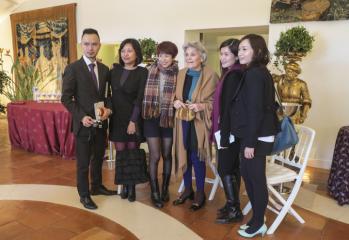 Baroness Philippine de Rothschild with Chinese tasters
Baroness Philippine de Rothschild with Chinese tasters
Hindsight is of course a beautiful thing. Having sent his son Thibault to bang the drum for Margaux, Paul Pontallier discards his sexiest peek-a-boo negligée for sober suit and tie and wrings his hands. ‘It would be terrible for us to lose our traditional markets because our traditional customers share our taste and culture...we are slightly worried but don’t see what we can do’.
The fact that the bubble bursts over the flop of an average 2011 vintage is seen as ‘not a bad thing’, says Andrew Caillard. ‘It’s good for the fine wine industry and good for Bordeaux’. A disarming Christian Moueix talks of the cyclical nature of Bordeaux affirming that ‘Bordeaux will remain the reference at least for one more century. We need to please people and not to impress them’.
It would have been interesting to hear more about Bordeaux’ often better value wines or the depressed economic situation and difficulties of those further down the pecking order. Or the gradual shift of the focus within China itself towards the enjoyment of wines based on quality and value and not merely status.
Nonetheless, with its many interviews and stunning footage of Bordeaux and China, the story of what happens when hubris meets infatuation is a powerful tale well told with fine cinematography by Steve Arnold and Lee Pulbrook. Bordeaux wooed China, and in seeking to give itself status and credibility in a money-is-no-object world of luxury brands, China fell for Bordeaux’ charms. The ribbing is gentle but telling.

